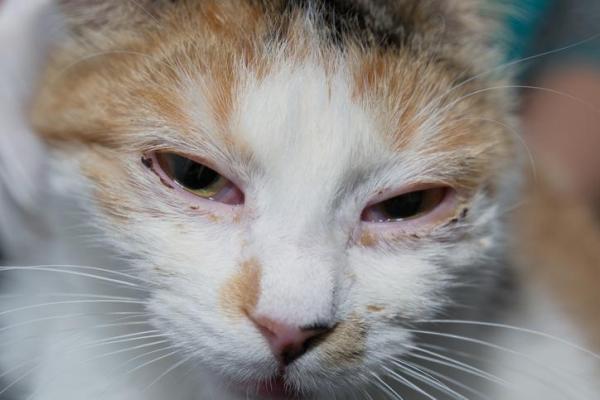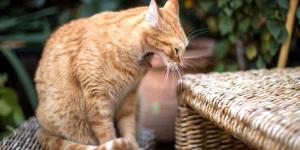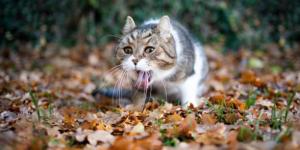My Cat Has a Gurgling Sound in Their Throat



See files for Cats
Although they may make a purring sound when relaxed and happy, a healthy cat shouldn't make noises when they breathe. Unless a cat is obviously choking on something, strange noises during breathing usually mean a respiratory problem. Whether acute or chronic, the problem should be addressed so proper treatment can be administered, if necessary. Some gurgling sounds from the cat's stomach may be normal if they are hungry or even if they have just eaten. When these sounds emanate from the throat, it is usually more troubling.
At AnimalWised, we understand why my cat has a gurgling sound in their throat. We look at the various causes of these respiratory noises and what possible treatment may be available.
Feline rhinotracheitis
Feline rhinotracheitis is a disease caused by feline herpesvirus type I (HVF-1). This virus is very serious, especially in younger or immunocompromised cats. Sometimes erroneously referred to as feline influenza, it is highly contagious and accounts for around half of the respiratory distress from which cats can suffer. The virus affects the DNA of the cat and can lay dormant until the cat's immune system is sufficiently weakened.
The symptoms of this virus are most noticeable in the cat's eyes and nose which can become purulent, but a gurgling sound in the throat may also be heard. This is because it can also affect the lower respiratory tract, specifically the larynx and lungs. It can cause feline pneumonia and can be fatal if untreated.
Treatment
Treatment should be based on the use of antiviral drugs, the most effective being famciclovir. Eye drops may help alleviate symptoms and antibiotics may be used to prevent secondary infections. Some cats stop eating, requiring appetite stimulants or tube feeding.

Laryngitis
The larynx is the vocal organ of the cat, i.e. the one that allows them to make sounds such as meowing. It is located at the entrance to the trachea and prevents food from entering the respiratory tract. This structure can become inflamed, resulting in laryngitis. This is most commonly due to infections or irritations. Even the common cold can result in feline laryngitis.
The first signs of laryngitis in cats are changes in the tone of their meows, usually becoming hoarse or dry. The cat may even lose their voice altogether. If they do make sound, it may only come out as a weak gurgling noise. Coughing may be accompanied by retching, but it should not cause the cat to vomit.
Treatment
Laryngitis usually resolves on its own. If it is due to a severe bacterial infection, a specific drug should be prescribed. Normally in cases of laryngitis in cats, they do not usually need antibiotics or corticosteroids. It is best to help keep them calm, give them time to rest and allow them to recover. Having a humidifier could also be a helpful form of symptom management.
Laryngeal paralysis
Laryngeal paralysis can occur due to genetic inheritance. This makes in more prevalent in certain breeds, including the Himalayan, Exotic or Persian. These cats are brachycephalic, a condition which can be seen in their flattened snouts and other less-visible traits. In these cases, it is usually diagnosed within a few months of life, while it usually happens in other breeds when they are older.
Among the clinical signs of a paralysis of the larynx in cats are the inability to meow, partial blockage of the upper respiratory tract and accompanying gurgling sounds in the throat. These gurgling sounds arise from air trying to travel through the now restricted airways of the larynx. We may see the cat make strange movements with their mouth as they have difficulty breathing.
Although there is a genetic influence, causes range from trauma to the recurrent laryngeal nerve during thyroid surgery or thyroidectomy, damage from collars, bites, lymphosarcomas in the neck, myasthenia gravis or ankylosis of the cricoarytenoid joint. The problem is often idiopathic, i.e. there is no discernable underlying causes.
Treatment
The treatment in these cases must be surgical to restore normality to the larynx. If the cat is in a severe respiratory crisis, they should be sedated and corticosteroids administered to reduce inflammation. This is because laryngeal air turbulence can induce laryngeal edema.
Learn more about feline breathing difficulties with our article on labored breathing in cats.
pleural effusion
Another cause that can explain why a cat makes strange noises with its throat is pleural effusion. Pleural effusion consists of an abnormal accumulation of fluid of a different nature in the space between the cat's pleural cavity due to a disorder in the elimination or production of fluid. This affects the correct expansion of the lungs in breathing which limit their movement.
Pleural effusion in cats can be a hydrothorax when it is a colorless fluid, hemothorax when blood is present, pyothorax when there is pus or chylothorax if the fluid is lymph fluid. The causes vary from kidney or heart disease to feline infectious peritonitis, tumors, penetration of foreign bodies, diaphragmatic hernia, torsion of the right middle pulmonary lobe, chest trauma, coagulopathies, bacterial infections, etc. Among the clinical signs of pleural effusion we find respiratory distress that can be confused with strange throat sounds, increased respiratory rate and coughing.
Treatment
The effusion will have to be controlled with oxygen therapy and thoracocentesis or puncture of the pleural space to extract the accumulated fluid. Diuretics can also be used and act against the cause that results in the effusion in question, through surgery, the use of chemotherapy or specific medical therapy depending on the case.
Nasopharyngeal growths
If your cat makes strange noises with their throat, it could also be because they have a mass in the nasopharynx. These are most commonly a tumor or an inflammatory polyp. Polyps consist of non-tumorous pedunculated masses that form from the mucosal tissue of the nasopharynx.
The causes of these growths is unknown, although in young cats it is suspected there is a congenital origin due to a remnant of the pharyngeal arch. In other cases, it may be due to chronic upper respiratory infections, infections ascending from the nasopharynx or chronic otitis media in cats.
In addition to unusual gurgling sounds in the throat during inspirational air intake, cats affected with nasopharyngeal polyps have signs such as inspiratory dyspnea and rattling sound in the throat (rales). If the ear is also affected, signs such as otorrhea, head shaking, scratching of the ear, feline Horner's syndrome and vestibular symptoms will likely appear.
Treatment
Treatment will depend on the location of the polyp, but it is always surgical through endoscopy in exclusive nasopharyngeal masses. When the ear is affected, surgery with ventral osteotomy of the bulla and surgical excision or simple removal of the polyp are required. After surgery, the use of corticosteroids is usually necessary.
As you can see, all the causes that can cause a cat to have a gurgling noise in their throat need to be diagnosed by a veterinarian. Do not treat the cat yourself if you are unaware of the problem.
This article is purely informative. AnimalWised does not have the authority to prescribe any veterinary treatment or create a diagnosis. We invite you to take your pet to the veterinarian if they are suffering from any condition or pain.
If you want to read similar articles to My Cat Has a Gurgling Sound in Their Throat, we recommend you visit our Breathing diseases category.
- Harvey, A., & Tasker, S. (Eds). (2014). Manual of Feline Medicine. Ed. Sastre Molina, SL L´Hospitalet de Llobregat, Barcelona, Spain.






